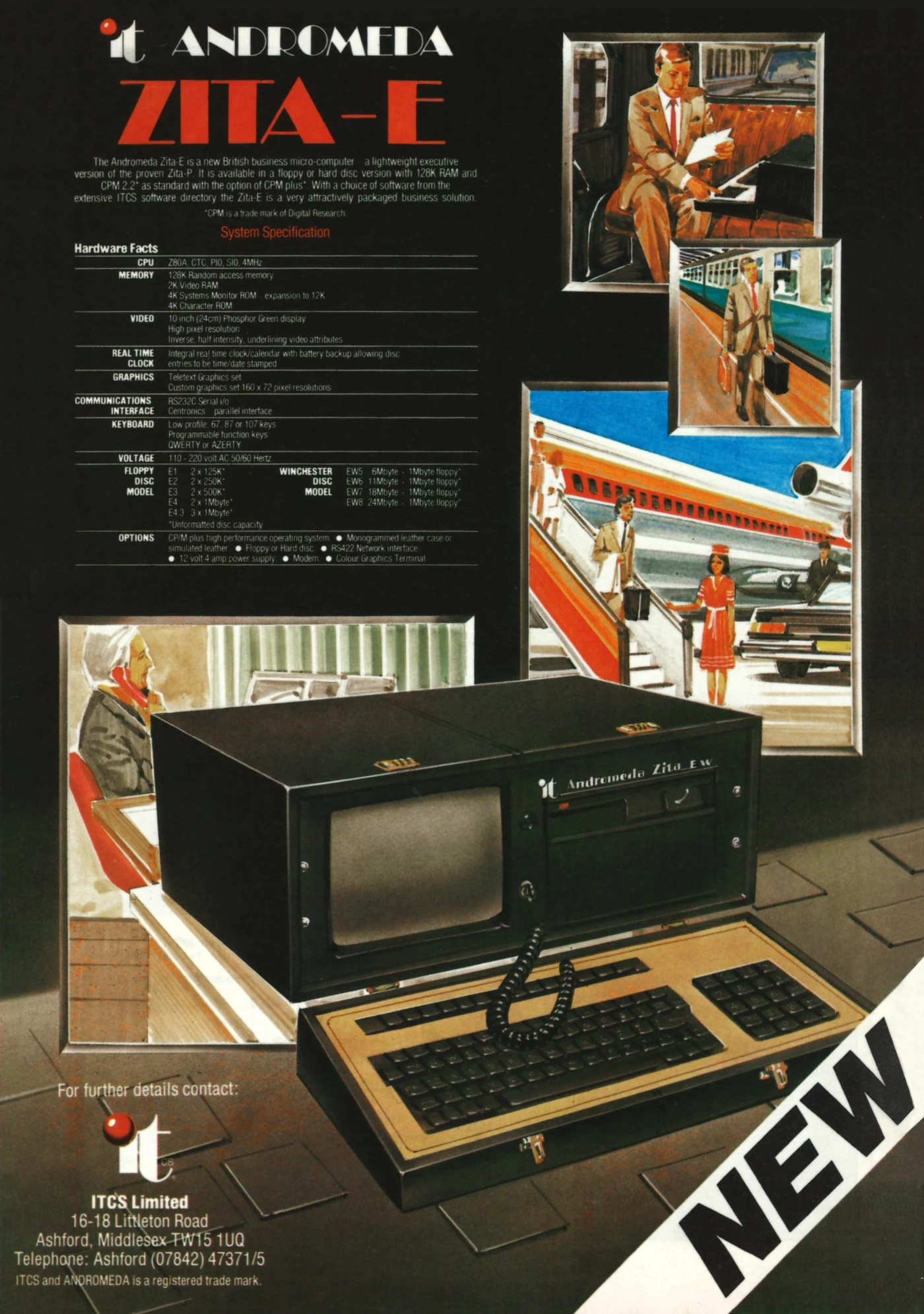ITCS Advert - August 1983
From Personal Computer World

New: The IT Andromeda Zita-E
This is another mystery entry, in this case for the Andromeda Zita-E - for Executive - from ITCS, or IT Computer Services Limited of Ashford, near Staines, in Middlesex.
The Andromeda's hardware was built in the UK using British components as much as possible, according to the company, using between thirty and fourty different subcontractors - apparently in an attempt to guard against the supply-chain issues that had "plagued many UK micro makers"[1] .
It was launched in the summer of 1983 and was sold as a light-weight "executive version" of the company's previous Zita-P, or Professional, which presumably had the same spec of Z80A processor, 128K RAM and CP/M 2.2.
The company's earlier range of CP/M micros appeared in October 1982, with the company's managing director David Lewis-Pryce claiming that "The Andromeda range has been launched with the intention of its becoming a serious contender as the world's leading microcomputer[2]".
The E version of the Andromeda Zita had an improved 10" display, which supported "high resolution" graphics of some sort. It was portable in the luggable rather than laptop sense - it weighed in at 36lbs, or nearly 16.5kg, with the hard-disk version - claimed to be the world's first Winchester-disk portable - weighing even more[3].
No fewer than nine variants of the "E" were available, with the E4.3 heading up the five floppy-only models with three 1MB disk drives, whist there were also four Winchester-based variants with the EW8 giving 24MB of storage. All of these EW variants also come with a 1MB floppy.
The entry-level version of the Zita-E retailed for £1,695 plus VAT, or around £8,900 in 2026. If that was too expensive, the company also unusually offered to loan any of its machines, subject to purchasing the software along with a maintenance charge, on a three-year contract.
Loan of the Alpha O - one its entry-level non-portable machines with a single 125K floppy - cost £595, with a £120 per annum service charge, whilst a mid-range model with twin 500K floppies plus a full suite of business software came to around £1,995, plus £550 per year service charge. According to Computer Weekly, this didn't seem "that bad".
The ITCS range was also available through well-known office-supplies company Ryman, which had previously been selling Dynabyte systems from the US, which in turn had been imported by Metrotech, until that agreement fell apart.
Meanwhile, managing director of ITCS, David Lewis-Pryce, was forecasting sales of around 1,500 machines by the end of 1983, with a further 5,000 in 1984.
This was perhaps optimistic as the earlier Zita-P, which Lewis-Pryce reckoned would "knock Osborne out of the market" when it was launched towards the end of 1982, had only sold 300 up to this point[4].
However, the company did get a boost when it won a contract for 500 of its portable machines from Key Information Technology of Saudi Arabia, bringing its order book up to 2,000 machines.
As well as its claim to be the first Winchester portable, ITCS also claimed that its machine was the first to be able to operate in extremes of climate - benefitting from a waterproof and hermetically-sealed case - which was obviously useful in the Saudi desert.
In order to keep up with the increasing demand, the company was taking on additional staff as well as increasing production from, er, five units a day up to forty[5].
The Andromeda also appeared to belong to a rather unfortunate subset of microcomputers - which included DEC's Rainbow - where it wasn't possible for users to format their own blank diskettes, but were instead required to purchase them from the manufacturer.
That was until Southampton computer reseller Xitan started selling a specialist disk formatting machine which could do the job. It could format Andromeda CP/M disks, which ITCS had said wasn't possible, and could even copy programs onto them, which ITCS said would never be possible[6].
The advert is also notable for its depiction of early 1980s transport, including the back of a London taxi cab, a dude walking past a rake of Mark 1 TSO British Rail coaches, and a McDonell Douglas DC-10, from the days when apparently you could drive right up to the plane to pick up your busy executive.
It's not known whether the apparent mis-spelling of the sixth letter of the Greek alphabet - Zita rather than Zeta - is deliberate. The company appeared to refer to several of its machines using different Greek letters, with entry-level models sometimes being known as Alpha, whilst other models had names such as Gamma, Theta and Epsilon.
Date created: 22 January 2025
Last updated: 02 February 2025
Hint: use left and right cursor keys to navigate between adverts.
Sources
Text and otherwise-uncredited photos © nosher.net 2026. Dollar/GBP conversions, where used, assume $1.50 to £1. "Now" prices are calculated dynamically using average RPI per year.